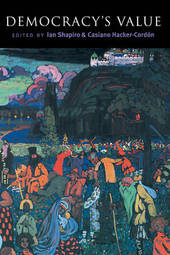
|
Democracy's Values
Hardback
Main Details
| Title |
Democracy's Values
|
| Authors and Contributors |
Edited by Ian Shapiro
|
|
Edited by Casiano Hacker-Cordon
|
| Series | Contemporary Political Theory |
|---|
| Physical Properties |
| Format:Hardback | | Pages:216 | | Dimensions(mm): Height 236,Width 158 |
|
| ISBN/Barcode |
9780521643573
|
| Classifications | Dewey:321.8 |
|---|
| Audience | | Tertiary Education (US: College) | | Professional & Vocational | |
|---|
|
Publishing Details |
| Publisher |
Cambridge University Press
|
| Imprint |
Cambridge University Press
|
| Publication Date |
19 August 1999 |
| Publication Country |
United Kingdom
|
Description
Democracy has been a flawed hegemon since the fall of communism. Its flexibility, its commitment to equality of representation, and its recognition of the legitimacy of opposition politics are all positive features for political institutions. But democracy has many deficiencies: it is all too easily held hostage by powerful interests; it often fails to advance social justice; and it does not cope well with a number of features of the political landscape, such as political identities, boundary disputes, and environmental crises. Although democracy is valuable it fits uneasily with other political values and is in many respects less than equal to the demands it confronts. In this volume (and its companion Democracy's Edges) prominent political theorists and social scientists present original discussions of such central issues. Democracy's Values deals with the nature and value of democracy, particularly the tensions between it and such goods as justice, equality, efficiency, and freedom.
Reviews'What is democracy good for? Even if it did no more than ensure the orderly and peaceful transfer of power from one government to another, that would be enough to make it attractive in comparison to the alternatives. But many people have hoped for more. They would like to think that there can (with the right institutions) be some reliable connection between democracy and other values such as freedom, social justice, or prosperity. The editors are to be congratulated on having assembled a first rate collection of sharply-argued essays that ask what we can realistically expect of democracy.' Brian Barry, Columbia University
|